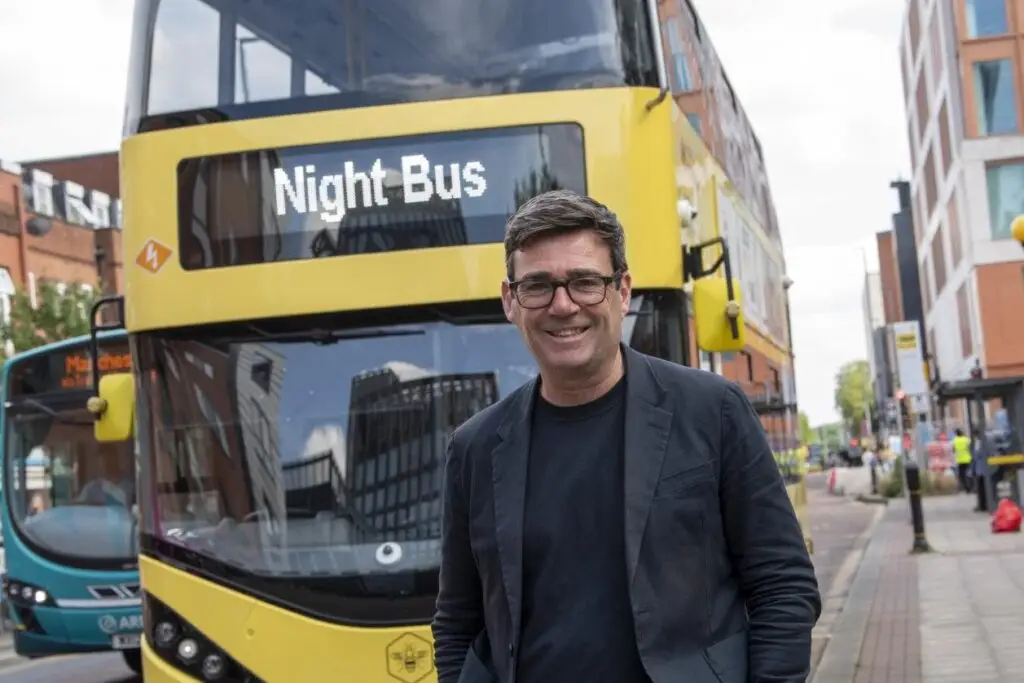Greater Manchester is taking a bold step in public transportation with the introduction of a night bus service starting from September 1. This initiative aims to provide 24-hour transport, significantly aiding the region’s night-time economy and benefiting workers in sectors like hospitality, healthcare, and logistics.
The new night buses will operate on the V1 and 36 routes, linking Manchester with Leigh and Bolton via Salford. This pilot project is groundbreaking as local authorities take control of bus services for the first time in nearly 40 years, marking a significant shift in the region’s transport policy.
Introduction of Night Bus Service
A groundbreaking move is on the horizon for Greater Manchester as a night bus service is set to launch, providing 24-hour transport from September 1. This initiative by the Bee Network aims to boost the night-time economy and support workers in hospitality, health, and logistics sectors.
The night buses will run on the V1 and the 36 routes, connecting Manchester with Leigh and Bolton via Salford. This pilot project introduces local control over buses after nearly four decades.
Supporting the Local Economy
The trial aims to operate hourly services, ensuring round-the-clock connectivity for around 135,000 people living within a short walking distance of the V1 and 36 routes. This effort was largely influenced by Sacha Lord, Greater Manchester’s Night Time Economy Adviser.
The initiative highlights the region’s commitment to facilitating access to employment centres at all hours. Mayor Andy Burnham emphasised the importance of having a robust transport system to sustain the city’s growth.
Addressing a Key Demand
Andy Burnham noted that better night-time transport is essential for residents, particularly those reliant on public transport. He credited Sacha Lord for playing a crucial role in actualising this project.
The introduction of the Bee Network allows for the development of services that meet the needs of both individuals and businesses across the city, Burnham added. This step aims to dismantle transport barriers and improve accessibility to various employment hubs.
Strategic Route Selection
The V1 and 36 routes were strategically chosen due to their proximity to vital night-time employment locations, such as hotels, bars, clubs, hospitals, and distribution centres.
These routes also cater to areas with higher public transport usage, including student populations, making this pilot a targeted approach to addressing specific needs.
The night-time economy is a significant contributor to Greater Manchester’s economic landscape, employing over 358,000 individuals in various sectors active during evening hours.
Promoting Safety and Convenience
Safety is a top priority for the night bus services. The Bee Network has already deployed Travelsafe Support and Enforcement Officers, a measure that will extend to this new pilot initiative.
Greater Manchester’s Transport Commissioner, Vernon Everitt, mentioned that further actions are being considered to enhance safety measures and public perception of safety on public transport.
This zero tolerance towards crime and anti-social behavior reflects a broader commitment to a secure transport environment, crucial for the success of the night bus service.
Trade Union Support
Colin Hayden, Regional Officer for Unite the Union, expressed strong support for the pilot, highlighting its potential to assist workers who face difficulties due to limited night-time public transport options.
He pointed out that many women, in particular, have expressed concerns about their safety when commuting late at night. This initiative seeks to address such safety issues, providing a reliable and secure mode of transportation for all workers.
The pilot scheme is seen as a step towards reassuring night-time economy workers about their safety and convenience when travelling during off-peak hours.
Future Prospects and Developments
The success of this pilot could pave the way for an expanded 24-hour transport network across Greater Manchester, potentially influencing other regions to adopt similar measures.
Sacha Lord, who has long advocated for extended night transport services, expressed satisfaction with the pilot’s launch, highlighting its role in creating transport equity for all workers regardless of their working hours.
This initiative could serve as a model for other cities seeking to enhance their night-time economies and improve transport connectivity.
Conclusion
The launch of the night bus service marks a significant milestone in Greater Manchester’s transport evolution. By focusing on safety, convenience, and economic support, this pilot project aims to offer a reliable solution for night-time commuters.
The initiative underscores a broader commitment to improving public transport infrastructure, making city life more accessible and safer for all.
The night bus service in Greater Manchester is a forward-thinking initiative aimed at boosting the night-time economy and supporting night-shift workers. By prioritising safety and convenience, this pilot project sets the stage for broader transport innovations in the region.
The project represents a significant step in improving the public transport infrastructure, offering a model for other cities to consider. With this initiative, Greater Manchester demonstrates its commitment to making city life accessible and safe for everyone, day or night.

